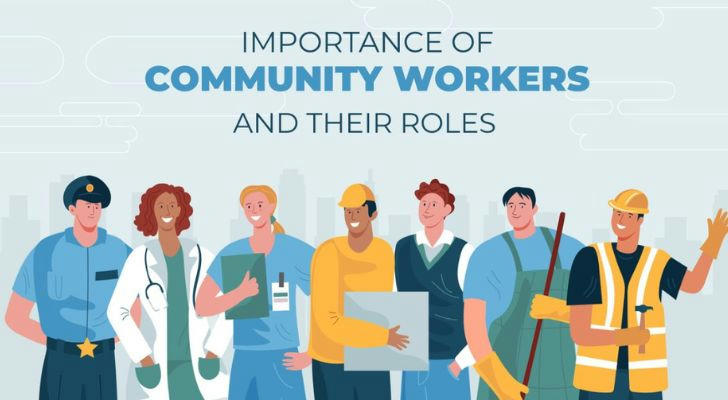From Support to Empowerment: The Essential Role of Community Workers
In today’s rapidly changing world, community workers play a crucial role in fostering social cohesion and addressing the diverse needs of local populations. These dedicated professionals serve as a bridge between individuals and the resources they require, empowering communities to thrive.

🌍 The Current State of Community Workers
Community workers are often the unsung heroes of society. They work tirelessly to support individuals and families facing various challenges.
They operate in diverse settings, including:
Non-profit organizations
Government agencies
Schools
Healthcare facilities
Their responsibilities can range from providing direct support services, such as counseling and resource navigation, to organizing community events and advocating for policy changes.
Despite their vital contributions, community workers often face significant challenges. These include limited funding, high caseloads, and the emotional toll of their work.
However , the demand for their services continues to grow, especially in light of increasing social issues such as poverty and mental health crises. As communities grapple with these challenges, the role of community workers becomes even more essential.
💡 The Significance of Community Workers
The significance of community workers lies in their ability to empower individuals and foster resilience within communities.
They provide essential support to marginalized populations, helping them access resources such as:
Healthcare
Education
Employment opportunities
By addressing the root causes of social issues, community workers contribute to building stronger, more equitable communities.
Moreover , community workers promote social justice and advocate for systemic change. They collaborate with local organizations, government agencies, and community members to identify needs and develop programs that address those needs. This collaborative approach enhances the effectiveness of their work and fosters a sense of ownership among community members.
🌟 Advantages of Becoming a Community Worker
Becoming a community worker offers numerous advantages:
1. Rewarding Profession: It allows individuals to make a tangible difference in the lives of others. Witnessing the positive impact of one’s work can be incredibly fulfilling.
2. Diverse Work Environment: No two days are the same. Community workers engage with a wide range of individuals and address various issues. This variety keeps the work interesting and allows for continuous learning.
3. Strong Community Connections: Community workers develop strong relationships within their communities. These connections lead to a sense of belonging and fulfillment, as well as valuable networking opportunities.

🛤️ How to Become a Community Worker
To become a community worker, individuals typically need a combination of education, skills, and experience. While specific requirements may vary, a bachelor’s degree in social work, psychology, sociology, or a related field is often preferred.
Practical experience is crucial. Many aspiring community workers gain experience through:
Internships
Volunteer work
Entry-level positions in social services
This hands-on experience enhances understanding of community dynamics and helps build essential skills such as communication and problem-solving.
Obtaining relevant certifications can also enhance job prospects. Certifications in trauma-informed care, mental health first aid, or community organizing provide valuable knowledge and skills.
📖 A Real-Life Case Study
Person Background:
Maria is a community worker in a low-income neighborhood. She started her journey as a volunteer at a local food bank. During her time there, she witnessed families struggling to put food on the table. This experience inspired her to pursue a degree in social work.
Process:
After graduating, Maria became a community worker. She quickly noticed that many families lacked access to affordable healthcare. To address this issue, Maria organized health fairs. She partnered with local clinics to provide health screenings and resources. At one health fair, she met a single mother named Lisa, who had been avoiding medical care due to costs. Maria helped Lisa navigate the healthcare system and find affordable options.
Result:
As a result of Maria's efforts, Lisa received a health screening and learned about affordable healthcare options. This experience empowered Lisa to take charge of her health and seek regular medical care. Maria’s work not only improved access to healthcare for Lisa but also inspired other community members to prioritize their health. Maria’s story exemplifies the transformative power of community workers, showing how they can address immediate needs and foster long-term empowerment.
❓ Q&A Section
Q1: What qualities are essential for a successful community worker?
A1: Successful community workers typically possess strong communication skills, empathy, cultural competence, and problem-solving abilities. They must be adaptable and resilient, as they often face challenging situations.
Q2: What types of organizations hire community workers?
A2: Community workers can be found in various organizations, including non-profits, government agencies, schools, healthcare facilities, and community development
